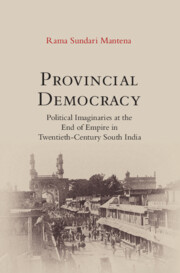Book contents
- Frontmatter
- Contents
- List of Figures
- Acknowledgements
- List of Abbreviations
- Map
- Introduction: Self-Determination, Federation, and Civil Liberties in Twentieth-Century South India
- 1 Liberalism and Anti-Colonialism in South India
- Part I Federation
- Part II Civil Liberties
- Conclusion: After Empire—Language and Regionalism
- Bibliography
- Index
Introduction: Self-Determination, Federation, and Civil Liberties in Twentieth-Century South India
Published online by Cambridge University Press: 30 April 2023
- Frontmatter
- Contents
- List of Figures
- Acknowledgements
- List of Abbreviations
- Map
- Introduction: Self-Determination, Federation, and Civil Liberties in Twentieth-Century South India
- 1 Liberalism and Anti-Colonialism in South India
- Part I Federation
- Part II Civil Liberties
- Conclusion: After Empire—Language and Regionalism
- Bibliography
- Index
Summary
Anti-colonial thinkers at the turn of the twentieth century already had a long history of grappling with concepts of liberty, equality, and self-rule in British India. Ever since the beginning of colonial rule, Indians had been debating the varied meanings of liberty, from Rammohun Roy who called for a free press as early as 1823 to G. Lakshmanarasu Chetty who established the English newspaper Crescent in 1844 in the colonial city of Madras to specifically represent Hindu interests organizing against the growing influence of Christian missionaries on British colonial policy. From this early period to the late nineteenth century, when Indian National Congress (INC) leader Bishan Narayan Dhar declared, ‘There is more of the revolutionary spirit in our vernacular novels and fugitive political and social tracts than in all the reports of the INC put together’, it was a testament to the vibrancy of vernacular public spheres in the provinces and presidencies of British India at the turn of the twentieth century. Indeed, anti-colonialism emerged from provincial archives as a force that was by nature transformational. Anti-colonialism not only encompassed movements organized against empire and colonial rule, but it also unleased revolutionary imaginaries of remaking colonial societies and mapping democratic futures. However, it was not until the early decades of the twentieth century that political demands intensified for the British colonial government to expand representative institutions towards the realization of the ideal of self-rule. Indeed, the language of liberty and selfdetermination used by Anglo-American statemen, such as Woodrow Wilson as well as Vladimir Lenin to describe the ideological struggle of World War I, impacted colonized peoples’ perception of their rightful place in a world of ‘free’ nation states, as argued by Erez Manela. The language of liberty and selfdetermination was not entirely new to anti-colonial thinkers at this time. Rather, the interwar period saw a dramatic rise and intense circulation of discourses of selfdetermination which had a profound effect on anti-colonialism. In scholarship on British colonial rule in India, what has been relatively unexamined is the impact that these discourses had on shaping a range of political imaginaries, including, for example, growing demands for provincial autonomy in British India and autonomy for Indian ‘native’ states (or the hundreds of princely states of India) in any future political arrangement after the withdrawal of the British Empire.
- Type
- Chapter
- Information
- Provincial DemocracyPolitical Imaginaries at the End of Empire in Twentieth-Century South India, pp. 1 - 29Publisher: Cambridge University PressPrint publication year: 2023



